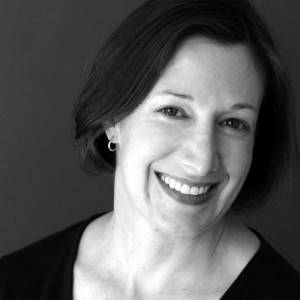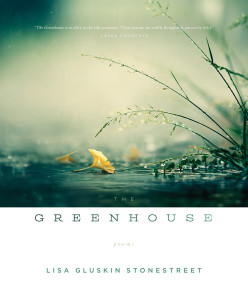The Writers Who Read series continues this week with poet Lisa Gluskin Stonestreet. 
Who are you?
Poet, writer, editor, teacher, mother, wife, daughter, friend. Enthusiastic cook, mediocre knitter, binge-reader, highly social introvert, recovering perfectionist, mental ambidextrist. Maker of costumes, Scrabble assassin, intermittent meditator, caffeine addict. Klutz with excellent small motor skills.
The more official bio: I’m the author of The Greenhouse (2014 Frost Place Prize) and Tulips, Water, Ash (2009 Morse Poetry Prize). My poems have recently appeared in journals including Rhino, Zyzzyva, The Collagist, Blackbird, and Kenyon Review. I write, edit, and teach in Oakland, CA.
Which book or series was your gateway into the world of reading?
I read very young and can’t remember learning to read. The earliest favorite book I remember is Winnie The Pooh. My mother tells me I dressed up as Christopher Robin for two years straight.
Nowadays, what makes you crack open a book instead of pressing play on your favorite Netflix show?
It’s a different kind of hunger. You can get powerful stories on screen, but only books give you that whisper in the ear, one human telling secrets to another. Sometimes you want that; sometimes you want something both more and less direct.
Which authors are auto-buys for you? Why?
Way too many – basically anything by a writer whose previous work I’ve loved. I’m especially unable to control myself in used bookstores, and with children’s books that I loved decades ago.
What is your book kryptonite–those unique settings, tropes, or character types that make you unable to resist reading?
In prose? Domestic realism colliding with a mystical strain of speculative fiction, or any genre/high-lit mashup, really; I’m a sucker for smart mysteries, too. Voices that play with sentimentality and/or irony and make it to the other side. Black humor. Smart-ass women. Children who suspect they might be changelings. Literary allusions that deepen the resonance but don’t beat you over the head with their literariness. In poetry? Luscious sound, complex and idiosyncratic rhythm, surprise in whatever form it might take.
What is your ideal time and place to read?
Am I allowed to say anywhere, always? Trains, bathtubs, screen porches, empty restaurants. In bed, out loud, with my husband and son. Alone on my back deck early in the morning, with the deer moving through the eucalyptus. Through 3 AM insomnia, guiltily, furiously.
Are you a re-reader? Why or why not?
Very occasionally. Often after a very long time. I just reread Katherine Paterson’s Jacob Have I Loved after 35 years, and it was as good as I remembered. When I was 12, that book made me want to be a writer. I read Henry James’ Portrait of a Lady at 20 and again at 45; it was different because I was different, on the other side, agewise, of Isabel’s story. It made me feel old and wise and very lucky. But most of my rereading is comfort reads, YA and mysteries mostly. I’ve read several YA series to my son, reread them myself, then listened with him to the audiobooks a few years later. I’m relearning the childhood joy of rereading.
 Which books have had the biggest influence on your writing?
Which books have had the biggest influence on your writing?
More writers than specific books, and here I’ll stick to poetry, though plenty of fiction writers and essayists have influenced me. Influence is such a strange concept. Somewhere in what I write are fragments of DNA drawn from Gerard Manley Hopkins, John Berryman, W.S. Merwin, Adrienne Rich, Jorie Graham, Brenda Hillman, Charles Wright, Jane Mead, Bob Hicok, Brian Teare…
What makes a book a satisfying read for you?
I enjoy strong plotting, but what actually happens in a book, its “aboutness,” is kinda secondary. A strong voice, a sense of being inside someone else’s head. Food for my brain, a character or speaker I want to know more about, equal amounts of seriousness and play.
What are you reading right now?
I just finished Emily St. John Mandel’s Station Eleven, which I loved, and I’m in the middle of Claudia Rankine’s Don’t Let Me Be Lonely, her book just before Citizen, which can be hard going and very much worth it. I’m also, very slowly, making my way through nonfiction books on autoimmune disorders, a history of violence, and reading and dyslexia.
~
Lisa Gluskin Stonestreet’s The Greenhouse was awarded the 2014 Frost Place Prize and published by Bull City Press in 2014. Her first book, Tulips, Water, Ash, was selected for the Morse Poetry Prize and published by Northeastern University Press. Her poems have been awarded a Javits fellowship and a Phelan Award, and have appeared in journals including Zyzzyva, Rhino, Kenyon Review Online, Cream City Review, At Length, Quarterly West, and Blackbird and in the anthologies Best New Poets and The Bloomsbury Anthology of Contemporary Jewish American Poetry. She writes, edits, and teaches in Oakland, California. Read some of her work and order books at www.lisagluskinstonestreet.com.
Want to peek on the bookshelves of other poets? Click here.

Great interview! I need to revisit Jacob Have I Loved too.